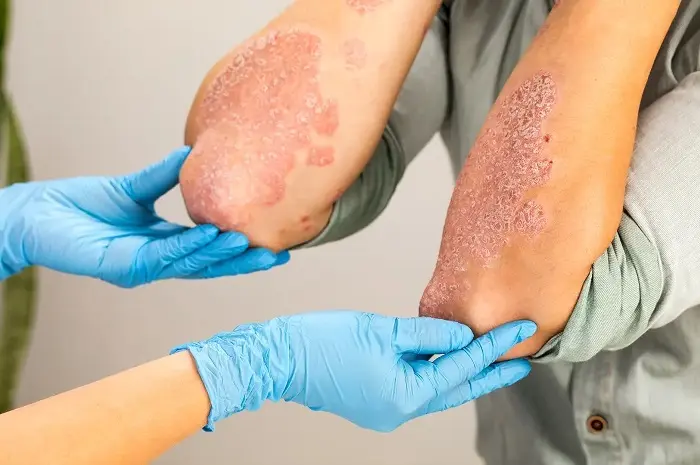Natural therapies can be effective in reducing the symptoms of psoriasis, a chronic skin condition characterized by red, inflamed, and scaly patches of skin. While there is no cure for psoriasis, various natural remedies and lifestyle changes can help manage and alleviate the discomfort associated with this condition. In this comprehensive guide, we will explore natural therapies that can reduce psoriasis symptoms.
1. Moisturize Regularly
One of the essential components of managing psoriasis is keeping the skin well-hydrated. Applying moisturizers can help alleviate dryness, reduce scaling, and minimize itching. Choose fragrance-free, hypoallergenic moisturizers and apply them after bathing or showering when the skin is still damp to lock in moisture.
2. Warm Baths with Oils
Taking warm baths with soothing oils like olive oil, coconut oil, or mineral oil can help soften scales and relieve itching. Adding oatmeal or Epsom salts to the bathwater can also provide relief.
3. Aloe Vera Gel
Aloe vera has anti-inflammatory and moisturizing properties that can help soothe the skin and reduce redness and itching. Applying aloe vera gel directly to the affected areas can provide relief for some individuals with psoriasis.
4. Dead Sea Salt Baths
Soaking in a bath with Dead Sea salt, which contains minerals like magnesium and calcium, has been reported to reduce psoriasis symptoms. These minerals can help soften skin scales and alleviate itching.
5. Turmeric
The active compound in turmeric, called curcumin, has anti-inflammatory and antioxidant properties that may help reduce psoriasis symptoms. It can be taken orally as a supplement or applied topically as a paste. However, consult with a healthcare provider before starting any new supplements.
6. Fish Oil Supplements
Omega-3 fatty acids found in fish oil have anti-inflammatory properties that may benefit individuals with psoriasis. Fish oil supplements can be taken daily, but consult with a healthcare provider for proper dosage and guidance.
7. Apple Cider Vinegar
Some people with psoriasis have reported relief from itching and scaling by applying diluted apple cider vinegar to affected areas. Ensure that the vinegar is diluted with water to avoid skin irritation.
8. Tea Tree Oil
Tea tree oil has natural anti-inflammatory and antiseptic properties. When diluted with a carrier oil, it can be applied topically to reduce itching and redness associated with psoriasis.
9. Capsaicin Cream
Capsaicin, found in chili peppers, can temporarily relieve itching and pain when applied topically in the form of a cream or ointment. It works by desensitizing nerve endings.
10. Probiotics
A healthy gut microbiome may contribute to overall skin health. Some individuals with psoriasis have reported improvement in symptoms after incorporating probiotics into their diet.
11. Dietary Modifications
Certain dietary changes may help reduce inflammation and improve psoriasis symptoms:
- Anti-Inflammatory Diet: Focus on foods like fruits, vegetables, whole grains, and lean proteins while minimizing processed foods, sugary beverages, and foods high in saturated fats.
- Gluten-Free Diet: Some individuals with psoriasis and gluten sensitivity or celiac disease have reported symptom improvement after eliminating gluten-containing foods from their diet.
- Omega-3 Rich Foods: Incorporate fatty fish (salmon, mackerel, sardines), flaxseeds, and walnuts into your diet to increase your intake of omega-3 fatty acids.
12. Stress Reduction
Stress can exacerbate psoriasis symptoms. Practicing relaxation techniques such as meditation, deep breathing, yoga, or tai chi can help manage stress and potentially reduce flare-ups.
13. Sunlight Exposure
Moderate exposure to natural sunlight can be beneficial for psoriasis because it promotes the production of vitamin D, which has anti-inflammatory properties. However, be cautious about overexposure, as sunburn can worsen symptoms.
14. Hydration and Smoking Cessation
Staying well-hydrated and quitting smoking are essential for overall skin health. Smoking has been linked to an increased risk of psoriasis and can worsen existing symptoms.
15. Consult a Healthcare Provider
While natural therapies can be effective for many people with psoriasis, it’s crucial to consult with a healthcare provider before making significant dietary or lifestyle changes or starting any new supplements. They can provide personalized guidance and monitor your progress.
In conclusion, natural therapies offer a range of options to help reduce psoriasis symptoms and improve overall skin health. While these approaches may not provide a complete cure for psoriasis, they can significantly enhance the quality of life for those living with this chronic condition.
Remember that psoriasis varies from person to person, so what works for one individual may not work for another. It’s essential to be patient and consistent in your efforts to manage psoriasis symptoms and consult with a healthcare provider for a tailored treatment plan.











